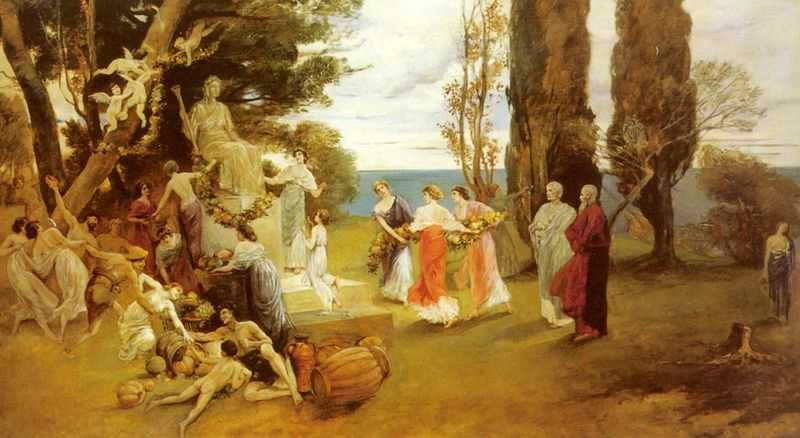created 2025-06-23, & modified, =this.modified
rel: Monsters - Evil Beings, Mythical Beasts and All Manner of Imaginary Terrors by Gilmore Beasts of the Deep - Sea Creatures in Popular Culture
Why I’m reading
I didn’t really like Beasts of the Deep - Sea Creatures in Popular Culture but I saw this volume in the series has some topics on Forest. I was unable to find this (and only was considering reading a small portion of the essays.)
But I found this.
I take it all to be something inspiring, rather than any kind of fact.
Forest of Eld
Archean Forests; Primeval and Tropical Forests; Cosmogonic and Traditional Forests.
Earliest vegetation would have been the simplest type as the Earth retained its internal heat, and the resulting warm and humid climate would have been favorable for the growth of fungi, molds, algae and mosses.
Absolute silence would reign in the cimmerian gloom ; no song of bird would be heard, no chirp of insect, nor rustle of leaf, for none of these yet had being.
To a wanderer in forest solitudes a sense of mystery is often perceived which lures him on and on into the verdant depths of the woodland world.
The forest always listens: Aures sunt nemoris, oculi campestribus oris – the field has eyes, the woods have ears
One of the most ancient traditional forests which we have knowledge of was the Forest, sometimes called the Grove of Eridu. It was mentioned in the Assyrian tablets, and as Babylonian tradition placed the site of the Garden of Eden in its vicinity, it was believed the Tree of Life grew therein.
Pinches noted “it was represented as a place to which access was forbidden, for ‘no man entered its midst’, as in the case of the garden of Eden after the fall.” In a myth called the Incantation of Eridu, it is described as having a “glorious fountain of the abyss”, a “house of wisdom”, sacred grove and a kiskanu-tree with the appearance of lapis-lazuli.
Alexander the Great, during his wanderings, is said to have encountered a forest of Maidens or Flower-Women.*
Dante describes the Cimmerian Forest, that infernal forest where the knotted, dark-leaved trees spoke to the wanderer when he endeavoured to pluck a twig.
When Orpheus was lamenting the loss of Eurydice and fingering his lyre in the abandonment of his grief, ancient tradition relates how, as soon as the first melancholy strains were heard, a forest of Elm trees sprang up, under one of which he reposed after his expedition to Hades had failed.
Fabulous Forests
Merlin and Vivien The Lady of the Lake
The enchanted forest of Broceliande in Brittany, forever associated with Merlin being reputed to contain his tomb, and his enchantment as he was enchanted by Vivien the Lade of Lake and entombed under a great stone. Merlin, wandering through the forest came to a beautiful fountain and sat by it to rest. To him came Vivien, whose mother, had prophesized the wisest man in the world should love her.
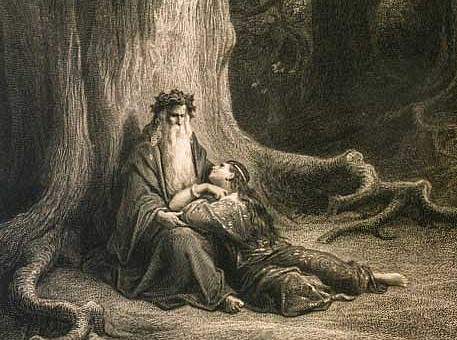
He would grant her all her desires but could never compel her to consent to his. Merlin told her his magic secrets and promised to meet her in a year’s time. He did so, and she demanded more wisdom, who he imparted. Finally she desired to know an enchantment that would bind him to her. He taught her, and so it came about the he was forever lost and withdrawn from the world of men.
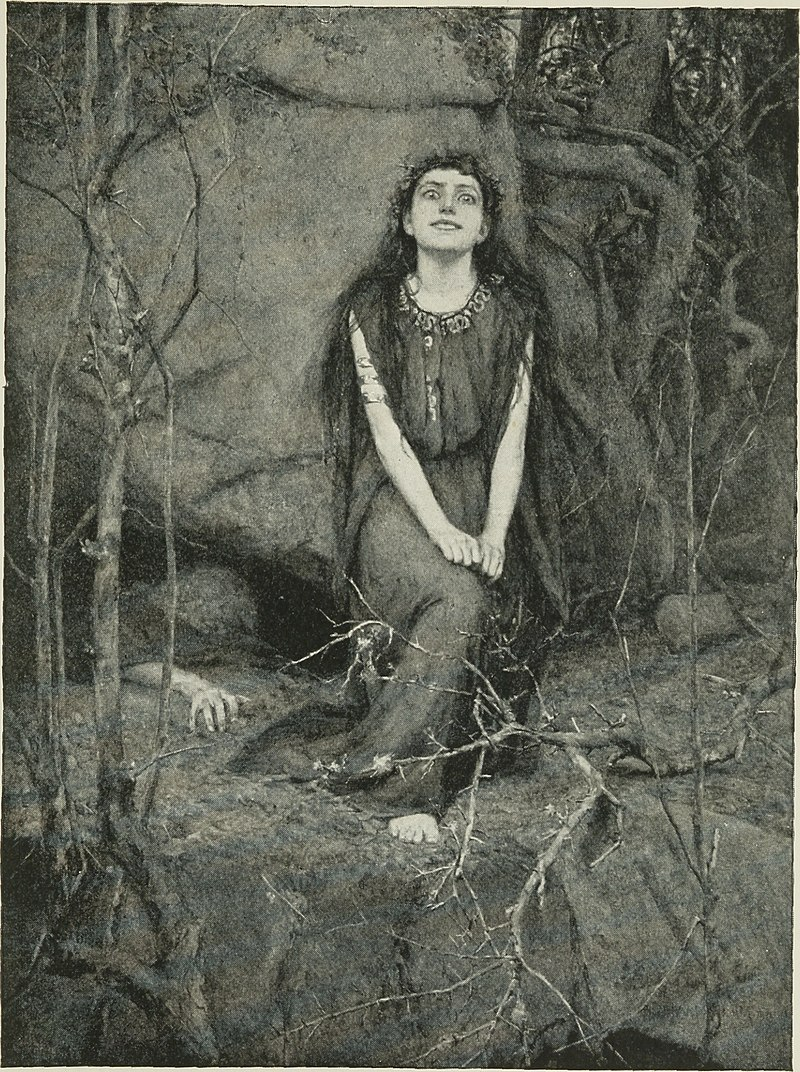
Of the nearby fountain of Beleton or Baranton lay an slab of stone and an Oak tree, from which hung a golden basin overshadowed it. Taking water from the spring causes the water to be changed, and forms itself into clouds with thick hail and the air becomes thick with shadows and resonant with the muttering of thunder.
Robert de Wace on his visit,
‘Thither I went in search of wonders, The forest I saw, the earth I saw, I sought wonders but found none, Foolishly I returned, foolishly I went back. Foolishly I went, Foolishly I returned thence, I sought foolishness. A fool I held myself.”’
The Castle of the Sun
There was a peasant who had a family of six sons and one daughter. The youngest son Yvon, and the daughter Yvonne being delicate and gentle, were treated as drudges. One day Yvonne was taking her cattle to pasture and she met a handsome stranger who married her and took her away.
After a year the brothers desired to see her, leaving Yvon behind. Riding on they came to a wide-spreading forest, in which they lost themselves. They found an old woman tending to a large fire to said that her son, a giant, could direct her to their sister. The giant led them to a great plain where he deserted them. They were bewildered, but after wandering found their way home. Yvon then set out to find his sister. He had similar adventures but eventually came to the crystal palace in the forest where his sister lived. She told him she was happy except her husband disappeared to a place she did not know each day. The husband returned and Yvon asked to accompany him the next day on his journey.
He agreed, so long as “if you touch or address anyone save for me, you must return home.” They set off and Yvon saw many strange sights, the strangest being two trees lashing one another with their branches. He lay his hands on them forbidding their fight and in a moment they became a woman and a man and thanked him for releasing them from their enchantment because of perpetually bickering. He was forced to return.
When he returned home he found his dwelling gone. When he asked where his father was the old man said “I have heard of him. He lived in the days when my grandfather’s grandfather was but a boy, and now he sleeps in the churchyard yonder”. Yvon realized his visit to his sister has been generations long.
Sleeping Beauty in the Wood
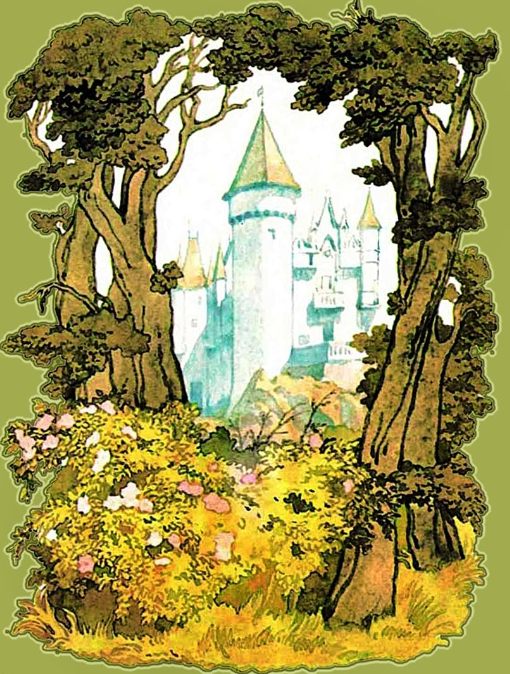
In Perrault’s tale of “The Sleeping Beauty in the Wood” the Prince advances towards the wood when all the great trees, the briars and the thorns moved aside to let him pass. No one could follow him, as the trees closed in again as soon as he passed.
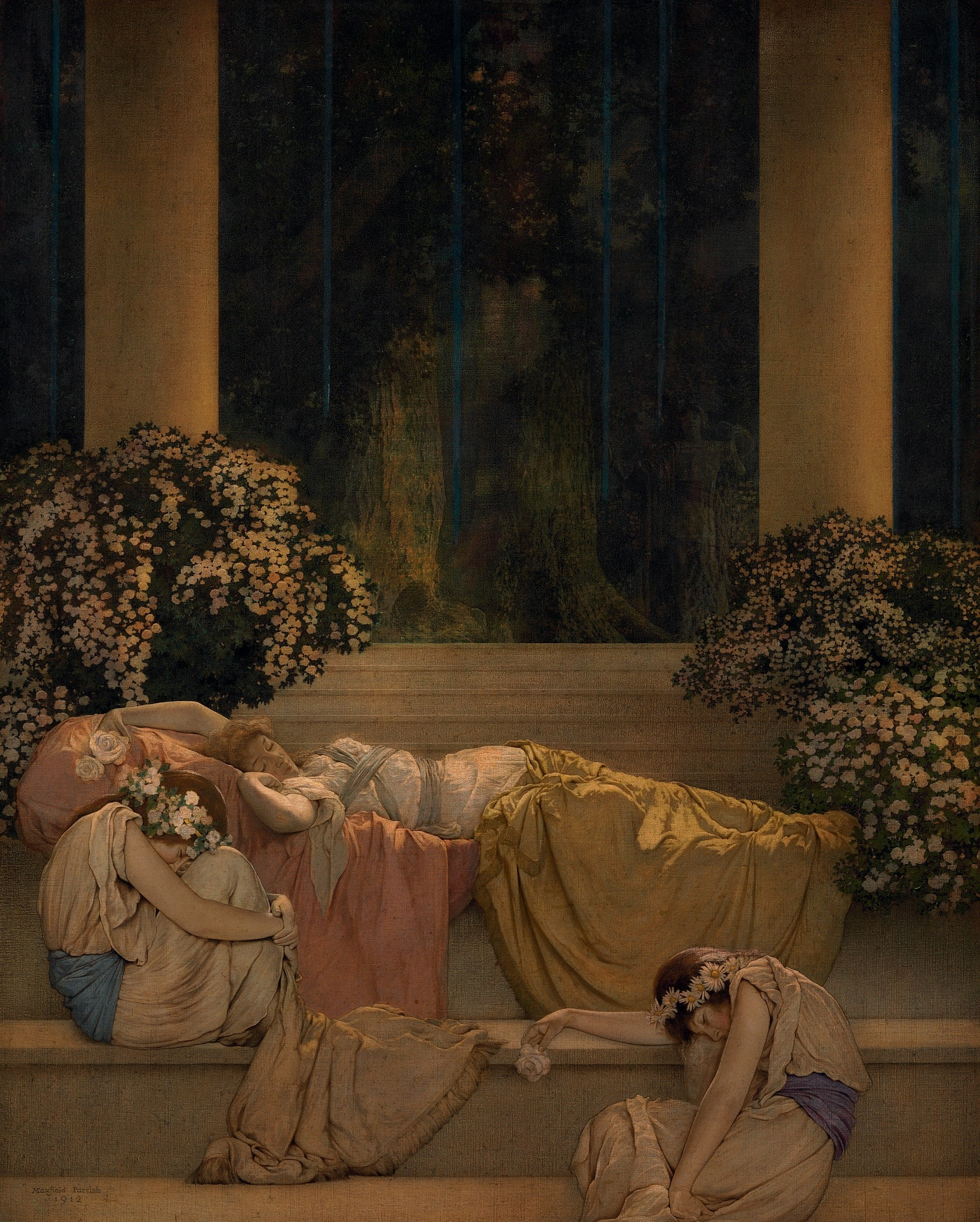
Sleeping Beauty in the Wood
I decided to read this .
A king and queen grieved because they had no children. They tried all waters, vows and pilgrimages but could not conceive. But at last, she gave birth to a daughter.
A christening was held, and all the fairies of the land came and bestowed gifts upon her, so the princess would have every imaginable perfection. They have a banquet and an aged fairy enters, whom no one invited and who for more than fifty years had never left the tower she lived, the people believing she was dead or bewitched.
The king orders her a seat, but being late they are missing a golden casket and so the aged fairy thinks herself slighted. The fairies began to give their gifts. The youngest saying she should be the most beautiful in the world, the next the temper of an angel, the third that she should do all with grace, the fourth perfect dance, the fifth a singing voice like a nightingale, and the sixth that she should play all music with skill.
The aged fairy said that the princess the princess should prick her hand with a spindle and die of it. At this a hidden fairy godmother emerged and said she could not fully counteract the spell, but instead the princess would fall asleep for a hundred years, at which time a king’s son would awaken her.
The king ordered all use of the spinning wheel to be banned.
Fifteen or Sixteen years later she encounters a woman spinning, and is pricked and falls in a swoon. The king recalls the prophecy.
The good fairy who saved her is notified. She is leagues away but is given boots by a dwarf which are called “seven league boots” that enable her to cover seven leagues in a single step. She arrives at the kingdom and touches everyone in the castle with her wand, except for the king and queen, and they all fall asleep.
The King and Queen leave the castle and as they leave a vast quantity of trees, interlaced with brambles and thorns surround it. Only the tops of the towers could be seen at a distance.
At the end of a hundred years the throne had passed from another family. The king’s son goes hunting and sees the towers in the distance. He hears stories of ghosts and the towers are the places where witches hold their revels.
But from an old peasant he hears of a beautiful sleeping princess held within, and decides to set forth on an adventure. The briars open up before him, allowing him entrance but close soon after separating him from his retinue.
The prince makes his way to the great courtyard, where he finds the guards lined on either sides in two ranks, snoring. The entire castle sleeps. He finally comes to a chamber all decked out in gold. He encounters the most beautiful sight he has seen. Reclining on a bed the curtains of which on every side were drawn black, a princess of some fifteen or sixteen summers whose radiant beauty has an almost unearthly luster.
He kneels next to her and she wakes.
He is immediately in love, and there is immediate connection. In four hours of talking they spoke not half of the things they wished to tell one another.
The whole palace awakens, playing music and they are married.
The moral is mentioned: Many a girl has waited long
For a husband brave or strong;
But I’m sure I never met
Any sort of woman yet
Who could wait a hundred years,
Free from fretting, free from fears.
Now, our story seems to show
That a century or so,
Late or early, matters not;
True love comes by fairy-lot.
Some old folk will even say
It grows better by delay.
Yet this good advice, I fear,
Helps us neither there nor here.
Though philosophers may prate
How much wiser ‘tis to wait,
Maids will be a-sighing still —
Young blood must when young blood will!
Forestry
Etymology
Forest –
late 13c., “extensive tree-covered district,” especially one set aside for royal hunting and under the protection of the king, from Old French forest “forest, wood, woodland” (Modern French forêt), probably ultimately from Late Latin/Medieval Latin forestem silvam “the outside woods,” a term from the Capitularies of Charlemagne denoting “the royal forest.” This word comes to Medieval Latin, perhaps via a Germanic source akin to Old High German forst, from Latin foris “outside” (see foreign). If so, the sense is “beyond the park,” the park (Latin parcus; see park (n.)) being the main or central fenced woodland.
Another theory traces it through Medieval Latin forestis, originally “forest preserve, game preserve,” from Latin forum in legal sense “court, judgment;” in other words “land subject to a ban” [Buck]. Replaced Old English wudu (see wood (n.)). Spanish and Portuguese floresta have been influenced by flor “flower.”
The idea of a Ban forest or Bannwald where a portion of the forest is protected. In the Middle ages a Bannwald referred to a forest where the territorial lord had exclusive rights to the forest.
In ancient times the phase of the moon (whether waxing or waning) was important to the felling of timber. The best time was when the moon was in conjunction with the sun, that day being called interlintum or “moon’s silence.” The underlying idea seemed to be that as the moon grew less in the sky so the amount of sap in the wood decreased or flowed downwards, leaving the wood dryer, much in the same manner as the waters of the ocean are affected as seen in the tides.
Death has been depicted as a wood-cutter.
Groves
Waller:
“In such green palaces the first kings reign’d ; Slept in their shades and angels entertain’d. With such old counsellors they did advise, And by frequenting sacred groves grew wise ; Free from th’ impediments of light and noise, Man thus retir’d, his noblest thoughts employs.”
Throughout the whole of ancient Germany the groves dedicated to certain deities were forbidden to be entered by anyone except the officiating priests or soothsayers,! and the gods were believed to sit enthroned on the trees of these sacred groves.
‘Stock-im-Eisen’ Nail Tree
The city of Vienna arose around a sacred grove, the last remaining tee was a venerable Oak. Hundreds of nails have been driven into the ancient tree for reasons unknown. The first nails were inserted while the tree was still alive (thus before 1440).
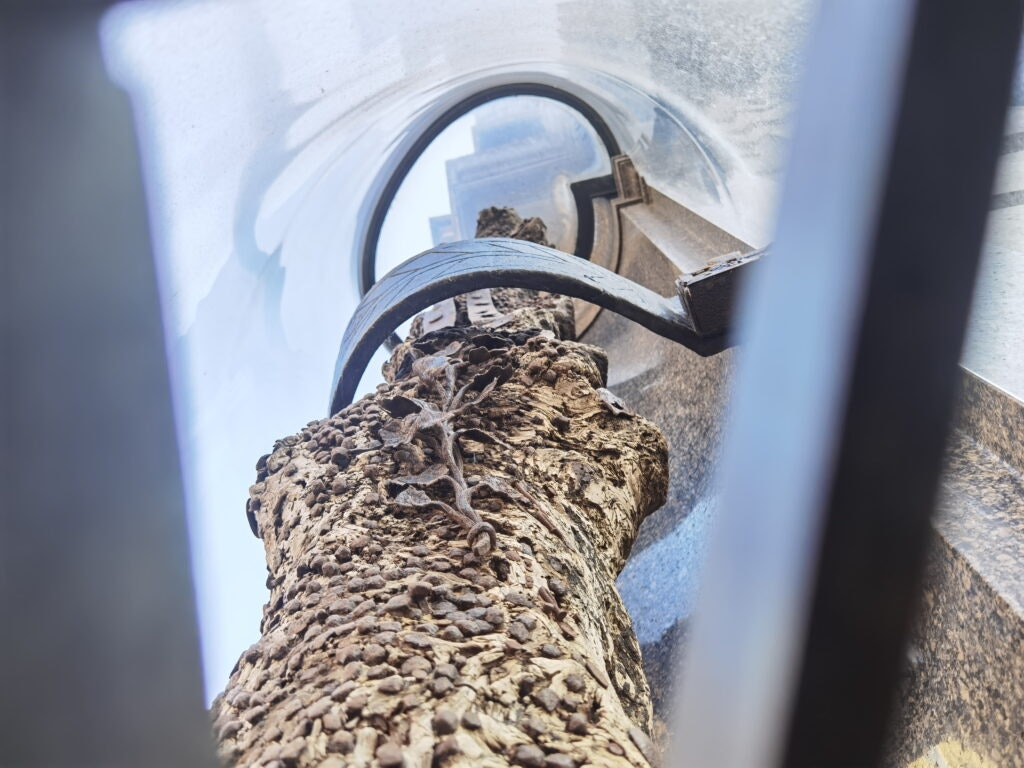
The name means “staff in iron” in German.
In the 18th century a tradition developed where traveling smiths and apprentices would hammer a nail into the tree trunk. The most likely reason for this is similar to dropping coins in a fountain or a wishing well, the nails serving as a votive for protection or gratitude for healing.
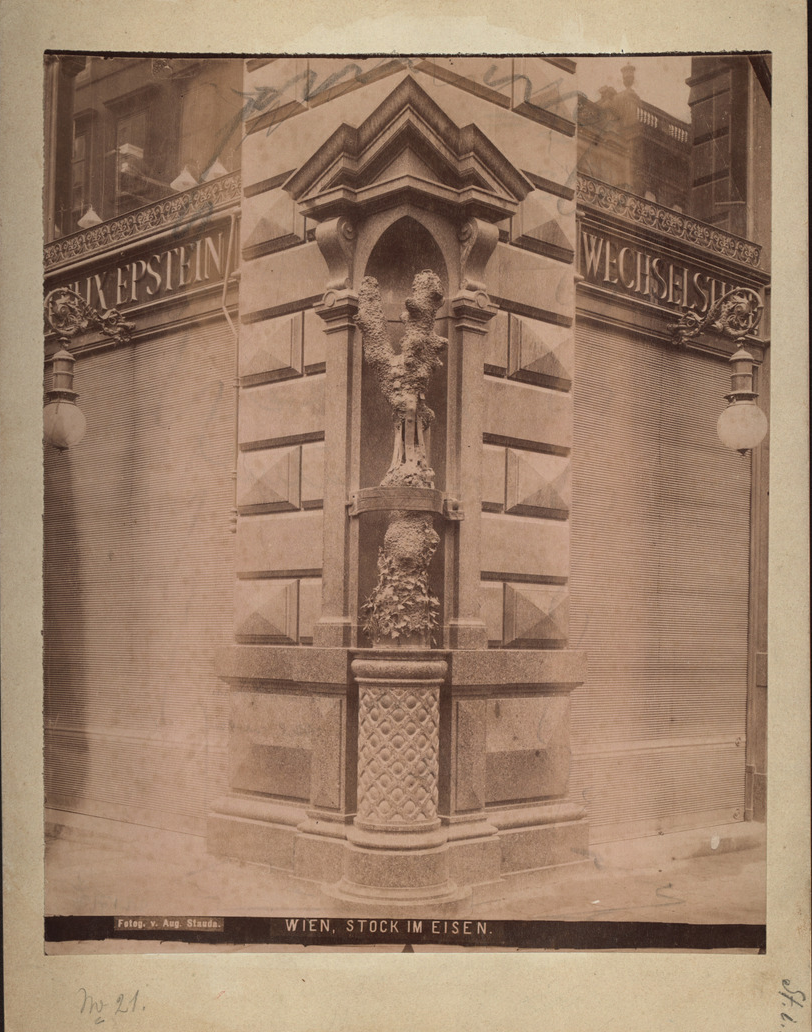
Mythical Denizens of the Forests and Woods
In Scandinavian countries the belief was held that when Lucifer and his angels fell from Heaven those who fell in the woods and forest remained there, becoming known as Wood-Spirits or Wood-Trolls.
Moss-Folk, or the Wild-Folk, as described by Fairy Family
A moss-woman!’ the hay-makers cry, And over the fields in terror they fly. She is loosely clad from neck to foot In a mantle of Moss from the Maple’s root, And like Lichen grey on its stem that grows Is the hair that over her mantle flows. Her skin, like the Maple-rind, is hard, Brown and ridgy, and furrowed and scarred ; And each feature flat, like the bark we see, Where a bough has been lopped from the bole of a tree, When the newer bark has crept healingly round, And laps o’er the edge of the open wound; Her knotty, root-like feet are bare, And her height is an ell from heel to hair.”
Pan and Syrinx
Among the loves of the God Pan was the Water-Nymph or Naiad called Syrinx. She was a Nymph of Arcadia, and Pan pursued her till she reached the River Ladon, on the banks of which she implored her sister Nymphs to enable her to cross it. Pan, as he thought, had grasped her, but instead, found his arms filled with reeds, into which she had been changed. Hearing the breeze, as it passed through these reeds, make a low musical sound, the god plucked seven of them and formed his pipes, which he named Syrinx, or popularly Pan-pipes.
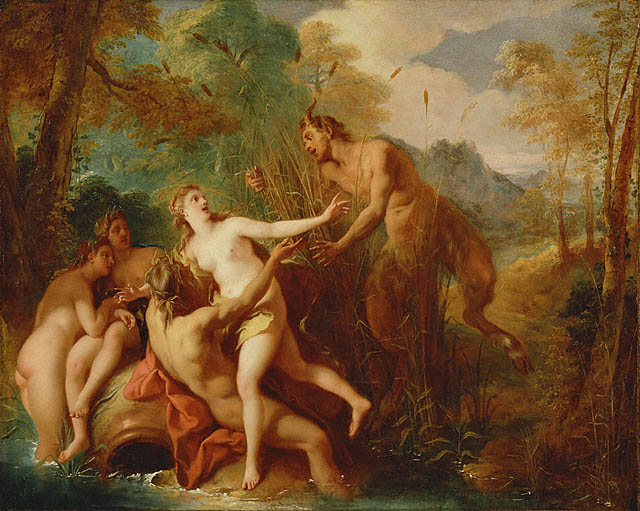
body-instrument Nonnus, Dionysiaca 16. 332 ff (trans. Rouse) (Greek epic C5th A.D.) :
“Pan cried out : ‘… I alone, Kythereia (Cytherea) [Aphrodite], must suffer. Alas for love! Syrinx [transformed into a reed] escaped from Pan’s marriage and left him without a bride, and now she [the pipes made from the plant] cries Euoi to the newly-made marriage of Dionysos with melodies unasked; while Syrinx gives voice, and to crown all, Ekho (Echo) chimes in with her familiar note.’”
As distinguished from the Dryads (nymphs of the forests), who having their abodes in trees and groves were free to move about, was another class of beings known as Hamadryads or purely Tree-Nymphs, who dwelt in trees, were believed to be part of the trees and whose existence was closely bound to the tree.
It was believed that the Hamadryad was female only to the waist, her lower extremities forming part of the trunks and roots of trees, in the same way a Mermaid was female to the waist, and the rest of her being a fish’s tale. They were said to grow in only remote and secluded spots where men were unlikely to find them.
Names of Hamadryads
- Karya (walnut or hazelnut)
- Balanos (oak)
- Kraneia (dogwood)
- Morea (mulberry)
- Aigeiros (black poplar)
- Ptelea (elm)
- Ampelos (vines, especially Vitis)
- Syke/Sykea (fig)
Argonautica:
‘*for one time, cutting trees Alone among the hills, he spurned the prayer Of the Hamadryas Nymph, who, weeping sore, With earnest words besought him not to cut The trunk of an oak-tree, which, with herself Coeval, had endured for many a year. But, in the pride of youth, he foolishly Cut it; and to him and his race the Nymph Gave ever after a lot profitless.’’
From Charon of Lampsakos:
“A man, named Rheekos, happening to see an oak just ready to fall to the ground, ordered his slaves to prop it up. The Nymph, who had been on the point of perishing with the tree, came to him and expressed her gratitude to him for having saved her life, and at the same time desired him to ask what reward he would. Rhekos then requested her to permit him to be her lover, and the Nymph acceded to his desire. She at the same time charged him strictly to avoid the society of every other woman, and told him that a bee should be her messenger. One time the bee happened to come to Rheckos as he was playing at draughts, and he made a rough reply. This so incensed the Nymph that she deprived him of sight.”
Ovid:
“Within the grove of Ceres tower’d an oak Huge in the bulk and strength of centuries ; Itself a grove: and up its massy trunk Midway, fresh wreaths and floral offerings hung Votive : oft under it the Dryads whirl’d In festive dances, and with linked hands Clipt its dark bole, which filled the utmost grasp Of nymphs thrice five! As far the encircling wood Was under it, as the uncropt herbage lay Beneath that wood. Yet the Thessalian foe His axe withheld not.
As he swung oblique Its fatal edge—shudder’d the sacred tree And moan’d ; each leaf, each acorn, at the stroke Grew pallid :—chill damp started on each bough ; And when that impious hand the wounded trunk Smote deep, blood flow’d from forth its cloven rind, As when a noble steer, a victim, drops At the altars, and swift gushing purple life His neck distains.
All in deep stupor gaz’d ! When, issuing from beneath the riven oak, This voice resounded ;—‘ I, the nymph most dear To Ceres, bleed within her sacred tree ; And dying I foretell a direful doom For thy fell deed impending: thus I find In death my solace.’
Yet the criminal His work still urges ; till the umbrageous mass, Tottering from countless blows, and dragg’d by ropes, Falls, crashing, crushing half the subject grove.’’
Arcadia
Arcadia
According to Greek mythology, Arcadia of Peloponnesus was the domain of Pan, a virgin wilderness home to the god of the forest and his court of dryads, nymphs and other spirits of nature. It was one version of paradise, though only in the sense of being the abode of supernatural entities, not an afterlife for deceased mortals.
Arcadia to develop into a poetic byword for an idyllic vision of unspoiled wilderness. Arcadia is a poetic term associated with bountiful natural splendor and harmony.
Pan was described as formed in the likeness of Nature, his horns resembled the rays of the sun and horns of the moon. His face was ruddy in the imitation of ether. He wore a spotted fawn-skin resembling the stars in the sky
